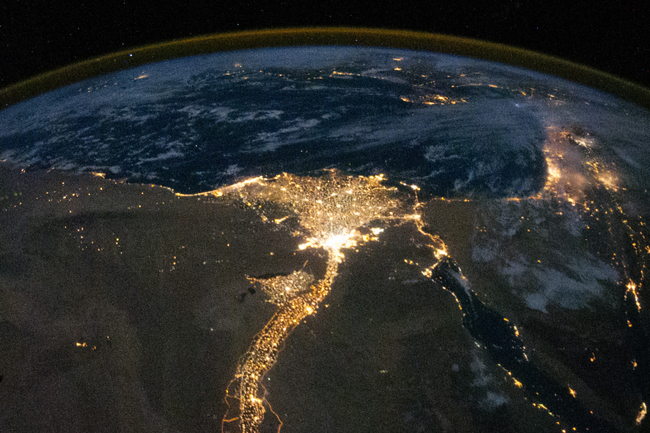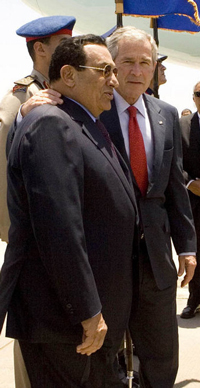
Catherine, the writer of this account and a resident of Egypt for the last several years, is a graduate of Flagler Palm Coast High School and the daughter of two prominent members of the community here–one a former sheriff now in private practice as a lawyer, the other a commercial real estate broker. Catherine was able to leave Egypt a few days ago, as her account relates. But she requested that her last name not be used as a precaution to guard against reprisals against her fiancé, an Egyptian who remains in Egypt (their wedding day is scheduled for March locally.)
A great joke that I heard shortly before the protests in Egypt began went:
President Obama: Mr. Mubarak, I think it’s time to say goodbye to the Egyptian people.
President Mubarak: Why, where are they going?

January 24 was the eve of the first day of Egypt’s uprising. There were calls for protests the following day. Talking among my Egyptian friends, many did not believe that the calls would amount to anything. Riot police preempted previous attempts at protests long before they began.
January 25 will probably go down in Egyptian history as the day Egypt found its voice, the date that will most likely be a public holiday if the the country succeeds in bringing about democracy.
That day I was working from home. It was eerily quiet. From outside my window I could hear the cries of the demonstrators as they marched to Tahrir Square, converging in a group too large for the riot police to disperse. The mood around the city was euphoric—a sense of hope that perhaps the people really could voice their demands without the police stopping them.
Click On:
- The Rise of Egyptian Aspirations, The Fall of the American Brand
- Bill Delbrugge Live From Egypt: “This Is Just a Different Type of Hurricane”
- Watch the Egyptian Revolution Live: BBC and Al-Jazeera Feeds Here
- Stetson Goes Tahrir: Panel Discussion on Egypt’s Future, Thursday (Feb. 10)
The next day, the road to work was filled with the dreaded police trucks that appear whenever there is a hint of opposition. Those trucks are a symbol of the dictatorial government. The trucks mean trouble, they mean arrests, and for the unlucky many, they mean torture. (The New York Times on Sunday is publishing the account of two of its employees who heard and witnessed the police’s beatings dungeons as they were detained overnight.)
January 26 and 27 – a Wednesday and Thursday – unfolded with more people taking to the streets. Fear of the police diminished, but hundreds were reported arrested, which undoubtedly meant there were many new victims of secret police torture. and so the movement began.
A colleague and I had been training for months to run in a half-marathon in Luxor, in southern Egypt. We left on January 27 planning to be out of Cairo for only two days. After Friday prayers on the 28th, the opposition movement was calling for a million-man march. My colleague and I went to our race (which went really well). We were anxious to get back and turn on the news to see if the protesters were really starting a new movement. That was the day everything changed.
By mid-afternoon it became apparent that if they hadn’t reached the million mark, they were close. We decided to go the Egypt Air office to change our tickets to early Saturday morning instead of the evening to get back before dark. We had already realized the internet had been cut in the whole country, and the mobile communication networks in Cairo shut down. We were unable to change or even book a new plane ticket since the Egypt Air system was down. Our only hope was to go to the airport and buy new tickets. Walking back to our hotel, I could feel the air around us change. Something was happening. People were acting nervous.
I asked someone what was going on. He said protesters were coming. A few minutes later, hundreds of protesters came down one of the main roads in Luxor chanting for Mubarak to leave. It was a very surreal moment. When the crowd passed, everything seemed to go back to normal.
In early evening we heard what sounded like gunfire. We told ourselves it was tear gas. A few riot police trucks passed in front of our window. Then it was quiet. We went downstairs to go to dinner and a tourist policeman told us we couldn’t go outside of the hotel. But everything was fine, he said. Just a precaution.
After dinner just across the street, we returned to our rooms and found that the protesters had set fire to the National Democratic Party headquarters in Cairo. That was the moment I think I realized I would not be returning to Cairo the next day.

(White House Photo)
We started hearing that no one was putting out the blaze, that the police had disappeared from the streets. Our colleagues back in Cairo were telling us the same thing. The police were simply nowhere to be found.
The next two days brought more news of looting, gunfire in the streets, the collapse of law and order. Neighborhood watch groups were on the streets to protect people from looters driving around on scooters. The building I work in was vandalized, a nearby mall was looted and torched, and Tahrir was still full of people protesting the government.
Perhaps we’ll never know for sure who the looters were. Personally I believe it was a tactic by the government to scare those protesting into going home. I believe that the police replaced uniforms simultaneously with plainclothes and were told to wreck havoc on the city. The looting began too suddenly and too coordinated with the disappearance of police around the city.
We were advised not to come back to Cairo. We heard of people being pulled over in cabs. Cairo airport was overcrowded, and we were unsure about our safety getting from the airport to our homes in central Cairo.
Thankfully, we were able to have someone outside of Egypt book us a ticket online and fax us the confirmation on one of the few flights not transiting through Cairo to Doha, in Qatar, and then Dubai, in the United Arab Emirates.
While I am safe now in Dubai, many of my colleagues and my fiancé remain in Cairo. I have felt conflicted emotions about leaving Egypt. I am thankful that I am safe but feel that I have abandoned the country I call my home.





























Jan says
Those words felt up close and personal. Gave me goose bumps. Hope all goes well for you Catherine.
Colleen says
What a great piece! Thank you Catherine for a real perspective into what is happening on the ground. I pray for the safety of your fiance and am glad to hear you are out of harms way! Peace, freedom and democracy to the people of Egypt.
Catherine Clarke says
Great article. Makes us all understand the importance of peaceful demonstrations. As a young woman in a strange town (Luxor), it must have been very scary. Once law and order breaks down, anything can happen.
Without internet access, which we all count on, it must have been hard to even know what was happening. And as a single yourg attractive foreign woman, it is very fortunate that you were able to get out of the country until rule of law is restored.
I believe when an opportunity to speak up comes along, we should all do that. We can change history, sometimes in a small way and sometimes in big shifts. Even in the United States today we can affect change.
Inna Hardison says
What a well written compassionate piece. Take care of yourself, and here’s to hoping everyone you love in your new home is safe and free when you return…
Teri says
Thank you for sharing your experience with us. Best of luck, Catherine.